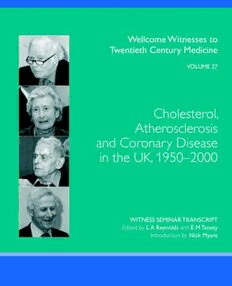
Cholesterol, Atherosclerosis And Coronary Disease in the UK, 1950-2000 (Wellcome Witnesses to Twentieth Century Medicine vol 27) PDF
193 Pages·2006·1.955 MB·English
Most books are stored in the elastic cloud where traffic is expensive. For this reason, we have a limit on daily download.
Preview Cholesterol, Atherosclerosis And Coronary Disease in the UK, 1950-2000 (Wellcome Witnesses to Twentieth Century Medicine vol 27)
Description:
Cholesterol began to be accepted after the Second World War as a significant cause of atherosclerosis and associated conditions, such as coronary heart disease (CHD). This Witness Seminar, chaired by Professor Michael Oliver, discussed the increasing understanding of its basic science. Early epidemiological studies demonstrated the relationship between excess saturated fat consumption and elevated levels of cholesterol, although cholesterol alone did not explain all population differences among gender, class, or heritage. Work on lipoprotein metabolism pointed to the establishment of hyphercholesterolaemia as a major risk factor for CHD, culminating in the development of cholesterol-lowering drugs, particularly the successful statins, available in the UK from the early 1980s, and confirmed by randomized controlled trials. The role of diet in heart disease has remained controversial in the UK, notwithstanding the food industry's introduction of functional foods such as cholesterol-lowering margarine. Later, recommended limits on the composition of dietary fat were agreed, and although extreme diets could reduce cholesterol, patient conformity remains difficult. Appendices on the diet-heart hypothesis and the development of lovastatin compliment the transcript. Contributors include Professor David Barker, Professor John Betteridge, Professor Gustav Born, Professor Richard Bruckdorfer, Professor George Davey Smith, Professor Paul Durrington, Professor David Galton, Dr Arthur Hollman, Professor Steve Humphries Professor Gordon Lowe, Professor Vincent Marks, Dr Paul Miller, Professor Jerry Morris, Professor Chris Packard, Professor Stuart Pocock, Professor Kalevi Py?r?l?, Professor Thomas Sanders, Professor James Scott, Dr Elspeth Smith, Professor Anne Soutar, Professor Gilbert Thompson, Professor Hugh Tunstall-Pedoe, Professor Neville Woolf and Professor John S Yudkin. [251 words]
See more
The list of books you might like
Most books are stored in the elastic cloud where traffic is expensive. For this reason, we have a limit on daily download.
